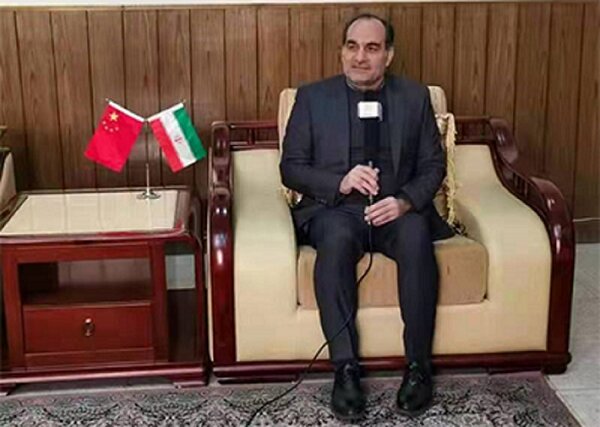Hawzah News Agency –Iran’s Cultural Attaché in Beijing, Abbas Ali Vafaee, said Iran and China have rich and civilized culture and stressed the need to develop joint filmmaking cooperation to get more familiar culturally between the two nations.
According to the Public Relations Department of the Islamic Culture and Relations Organization (ICRO), Abbas Ali Vafaee, in an interview with China CCTV Channel 6, spoke about Iran-China relations, especially the today’s Iranian cinema. Following are question put to Iranian Cultural attaché and his answers:
* This year we are in the 50th anniversary of establishment of diplomatic relations between China and Iran. Cultural diplomacy includes dialogue, information and art. Over the past 50 years, how do you see the role of filmmaking as a tool to strengthen cultural exchange and mutual understanding between the two countries?
**First of all, I congratulate the 50th anniversary of Iran-China relations.
This art can be very effective in get familiar of two nations because it shows history and civilization. There have been many capacities in this sector that have been neglected, in this regard, not many films have been produced, one of which is "The Blue Silk Road".
There is a need for more cooperation between Iran and China in this field to make films, and fortunately the preparations have been made because a memorandum on cooperation has been signed this year and the presence of Iranian directors and films in China will help this sector.
* China and Iran have a history of cultural and economic exchanges along the Silk Road. How do you see the similarities between Chinese and Iranian culture and civilization?
**The two countries are historical and civilized nations, and this is the basic principle that civilizations need and attract each other. Iran and China have been connected since the Achaemenid and Han dynasties, and the Silk Road has connected the two countries.
* In recent years, Iranian films and Iranian cinema talents have won many important awards at the Berlinale, Cannes and Venice International Film Festivals. In your opinion, what made Iran and domestic filmmakers able to create so many of the best films in the world?
**Today, filmmaking in Iran is based on scientific components. Most of the world-renowned people have been in this field from a young age and are familiar with scientific, academic and professional issues. One of today’s prominent directors has written a large number of screenplays and with this art It is familiar, and of course the innate genius has helped this acquired knowledge to manifest itself internationally.
In Iran, the film has its own fans and this support of the people has been effective for the emergence of film art and also for the brilliance of directors.
* Several Iranian films such as "Contrary Route", "Yellow" and "Castle of imagination" have won awards at the Beijing International Film Festival and the Shanghai International Film Festival in recent years. How do you think this is useful for Chinese audiences to understand Iranian films and Iranian culture?
**We are very happy that Iranian directors are shining in Chinese festivals. Naturally, this presence and selection contributes to the spread of Iranian films in this country and encourages Chinese directors to cooperate in the production of joint films.
In the last few years, we have seen good proposals for cooperation from China, and on the other hand, paying attention to Iranian films in academic research and specialized Chinese journals in recent years will definitely lead to the introduction of Iran in this field and people will become more aware of this Iranian art and craft. * It is very important for filmmakers to choose a great filming location. Since Iran has many beautiful places to see, please tell us in your opinion what are the top 3 locations of the film and why?
**Filming locations should be chosen according to the subject, content and type of genre, and the beauty and landscape of a place can"t be considered useful only for filmmaking. This issue is mentioned in Iranian stories that are in the form of poetry and history.
* As far as you know, during the Covid-19 epidemic, did the two countries have any connection or cooperation in the film industry in the joint fight against this epidemic?
**Unfortunately, due to travel restrictions, no work has been done in this section. Although some Iranian directors have been in China during this period and have shot parts of their films in China, but due to the restrictions, there is a good cooperation in this area. Constituency not done.
* What is your impression of Chinese films? Can you name some of your favorite Chinese movies?
**I watch some Chinese TV series on TV and I find commonalities between our country and China. Respect for elders and family is one of these issues. I heard the movie One Night with Beijing, which is a special story, but I have not seen this movie yet.


Your Comment